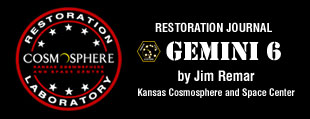 advertisements advertisements
|

|

Introduction | Background | Journal
The Cosmosphere museum located in Hutchinson, Kansas maintains a world-class space artifact restoration program. With more than 100 major projects to its credit — including the Apollo 13 command module "Odyssey" and Mercury spacecraft "Liberty Bell 7," the Cosmosphere is considered a leader in restoration science, a field that it pioneered two decades ago.
The Cosmosphere's current restoration is NASA's Gemini 6 spacecraft. Commanded by Wally Schirra and piloted by Thomas Stafford, Gemini 6 launched in 1965 to fly the first rendezvous with another crewed spacecraft, Gemini 7.
Gemini 6 arrived at the Cosmosphere on Oct. 2, 2003 from the Saint Louis Science Center in Missouri, where it had been on display. After restoration is complete, the capsule will be placed on exhibit in Oklahoma City.
This journal, prepared in partnership with collectSPACE, will track the Cosmosphere's progress restoring Gemini 6.
Condition Upon Arrival
The capsule was skinned with a plexiglass covering. This aspect made a thorough internal examination impossible.
Overall, the capsule was in excellent condition. There were no signs of active deterioration/corrosion.
Exterior
The exterior shingles were in very good condition. All panels appeared to be original and intact. No restoration will be required to these areas.
Exterior stenciling on the capsule was faded, as was the American flag. Fading appeared to have been gradual and done over a period of time. The stenciling did not appear to be actively cracking or flaking, but it will be more closely examined while restoration is underway.
The rear heatshield was in excellent condition.
The exterior plexiglass skin was in very poor shape. It was showing signs of active degradation. In several places the plexi was cracked and missing attachment screws. Overall, the plexi is discolored (beginning to yellow).
Interior
There are several interior components and hardware pieces missing. These were probably removed after the mission.
The National Air and Space Museum recently transferred several pieces of Gemini hardware to the Cosmosphere. Among these pieces were several Gemini 6 components. These will be reinstalled back into the capsule.
Other missing components will be replaced, as possible, using original Gemini hardware. The missing components were as follows:
Pilot abort control handle
Pedestal panel repress valve (mock-up)
Center panel cabin temp control knob
Center/back storage container and panel
Cabin recirculation levers
Several overhead switches and circuit panels
Command side stow handle and switch
Command side drogue and parachute switches
Pilot side encoder controller and switch
Several pilot side panels, levers and switches
Waste management panel
Drink control panel
Several cabin lights
Insulation pads and seat/couch cushions
Interior cabin mirrors
Restoration Journal
Presented with most recent entry first
December 23, 2003
December 19, 2003
December 18, 2003
Installed pilot side hatch.
Continued minor interior and exterior clean. All corrosion has been removed.
Reinstalling missing exterior bolts.
December 17, 2003
Finished installation of all internal hardware.
Began to prepare pilot side for reinstallation of hatch.
Finished external cleaning.
December 16, 2003
December 15, 2003
December 12, 2003
December 11, 2003
December 10, 2003
Majority of interior hardware now reinstalled.
Reinstalled the pilots side RCS panel.
Removed command side RCS panel. Removed 2 mockup RCS engine. Installed two flown RCS engines in their place.
December 9, 2003
Continued installation of exterior shingle bolts.
Removed pilot side forward RCS panel. Interior forward RCS section looks good. No signs of active corrosion. RCS engines are mockups. I have one flown RCS engine to reinstall.
All interior forward RCS insulation blankets have been removed prior to this restoration. It has been decided not to reinstall the insulation due to its condition and potential to attract moisture.
Continued to reinstall flown hardware. Reinstalled air flow pane; ENCR Timer; circuits (drogue parachute circuits/ECS circuits); switch covers.
December 8, 2003
Inspected hatch, again no reappearance of corrosion. Will clean the hatch one more time.
Interior hatch window needs to be reinstalled.
Removed final mockup hardware from interior.
Removed three shingles from pilot side of spacecraft to inspect the super structure of the craft. Interior super structure/skeleton in very good condition, no signs of corrosion.
All interior insulation had been removed prior to this restoration.
Began to reinstall flown hardware back into spacecraft. Reinstalled the pedestal panel; cabin temperature control knob; several overhead switches and circuits; command side drogue and parachute switches; pilot side encoder controller; waste management hardware; interior cabin mirrors.
Will continue to install hardware, gauges, switches and circuits, as well as interior insulation blankets.
Once all hardware is reinstalled, I will clean the interior of the spacecraft. After the interior is cleaned, the pilot side hatch will be reinstalled.
The final step in the restoration will be the total cleaning of the exterior of the spacecraft.
December 5, 2003
Continued to remove mockup hardware.
Finished cleaning corrosion from pilot hatch. Noticeable difference from pre-cleaning of hatch and post-cleaning.
Will let the hatch set to see if corrosion reappears.
December 4, 2003
Finished removing the plexi covering. Smell of off gassing is no longer present.
Began to remove corrosion from Pilot hatch. Cleaning with hatch with mineral spirits. Dirt and corrosion coming off nicely.
Began to remove interior mockup hardware.
October 24, 2003
Began removing protective plexi covering. Very strong smell of off gassing.
Conducted an initial analysis of spacecraft. Overall in good condition. Pilot side hatch has more corrosion than anticipated.
Overall, the exterior of the capsule is very dirty. There is some corrosion. The majority of this is probably a result of the protective plexi cover (dust build-up in groves of shingles is great). The exterior of the spacecraft will need a great deal of cleaning.
The interior is dirty and full of dust. More mockup hardware than first thought.
Jim Remar is director of collections, exhibits and buildings for the Kansas Cosmosphere and Space Center.
|

© 2022 collectSPACE.com All rights reserved.

|
|

|

|
